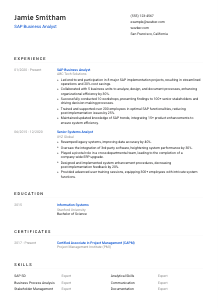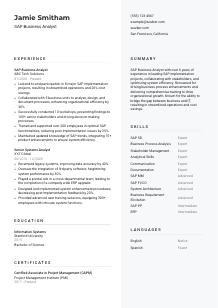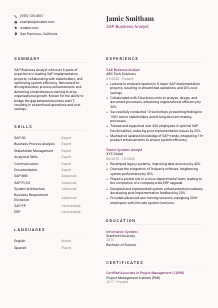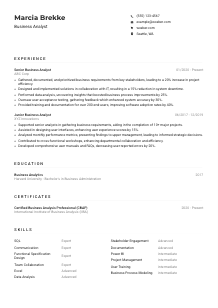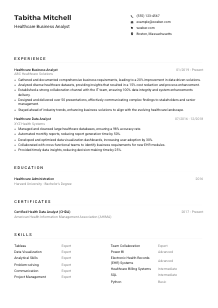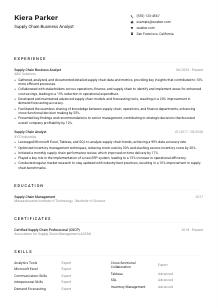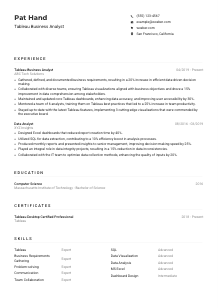SAP Business Analyst Resume Example
Navigating systems, but your resume feels disconnected? Delve into this SAP Business Analyst resume example, integrated with Wozber free resume builder. See how effortlessly you can mesh your functional insights with job criteria, forging a career profile that runs as smoothly as an automated process!
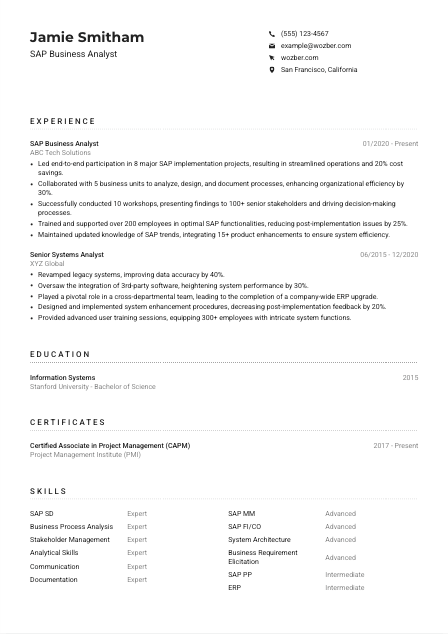
How to write a SAP Business Analyst resume?
Hello there, SAP Business Analyst in the making! Embarking on a journey to craft a resume that not only ticks all the boxes but also stands out in a pile, awaits your wisdom and expertise. With the intricacies of SAP systems and the challenges of business analysis, your role is crucial and competitive. Hence, leveraging the Wozber free resume builder, this guide will provide you with the insights to create a resume that is perfectly tailored to your SAP Business Analyst role, ensuring it's primed for success in the Applicant Tracking Systems (ATS).
Ready to dive in? Join me as we craft a narrative that not only matches the job description but showcases your unique value.
Personal Details
First impressions count, and your Personal Details section is the handshake before you even step into the interview room. Tailoring this section to fit the SAP Business Analyst position is key. Let's dive into refining those initial lines to resonate with your future employer.
1. Highlight Your Name
Kickstart with your name, ensuring it's prominent. A well-presented name sets a professional tone. Consider using a readable font that's slightly larger than the rest of your resume content. Your name isn't just a label; it's the headline of your professional story.
2. Match the Job Title
Under your name, align with the role by stating 'SAP Business Analyst'. This not only shows that you're applying for the right job but also aligns your profile with the position's requirements right from the get-go, making it easier for the ATS and hiring managers to spot a perfect fit.
3. Ensure Your Contact Information is Complete and Professional
List your most reliable contact number and a professional email (think: firstname.lastname@email.com). Accuracy here is vital to ensure potential employers can easily reach you. A simple typo could mean a missed opportunity.
4. Confirm Your Location
Given the job's location requirement in San Francisco, California, clearly listing your address confirms your eligibility and availability, saving time for both you and your prospective employer.
5. Add Professional Online Profiles
A LinkedIn profile link can significantly bolster your application, offering an in-depth look at your professional journey. Ensure it's updated and reflects your resume to maintain consistency.
Takeaway
The Personal Details section is more than just a formality. It's an opportunity to immediately show the hiring manager that you're in the right place, you mean business, and you're easy to contact. Take a moment to ensure your details are polished and professionally aligned with the SAP Business Analyst role.





Experience
Your experience section is where you shine - showcasing your journey through the challenges and triumphs of being a SAP Business Analyst. Tailoring these entries to reflect the job description's demands requires a bit of strategy and a lot of heart.
- Led end‑to‑end participation in 8 major SAP implementation projects, resulting in streamlined operations and 20% cost savings.
- Collaborated with 5 business units to analyze, design, and document processes, enhancing organizational efficiency by 30%.
- Successfully conducted 10 workshops, presenting findings to 100+ senior stakeholders and driving decision‑making processes.
- Trained and supported over 200 employees in optimal SAP functionalities, reducing post‑implementation issues by 25%.
- Maintained updated knowledge of SAP trends, integrating 15+ product enhancements to ensure system efficiency.
- Revamped legacy systems, improving data accuracy by 40%.
- Oversaw the integration of 3rd‑party software, heightening system performance by 30%.
- Played a pivotal role in a cross‑departmental team, leading to the completion of a company‑wide ERP upgrade.
- Designed and implemented system enhancement procedures, decreasing post‑implementation feedback by 20%.
- Provided advanced user training sessions, equipping 300+ employees with intricate system functions.
1. Unpack the Job Description
Begin with dissecting the job description, highlighting keywords and phrases such as 'SAP implementation projects', 'analyse, design, and document business processes', and 'provide training and support'. These will be your guiding stars.
2. Organize Chronologically, With Precision
Arranging your roles from the most recent backwards, ensure each position includes the job title, company name, and duration of employment. Clarity and accuracy here make it easy for the ATS and the hiring manager to follow your professional narrative.
3. Craft Compelling Accomplishments
For each role, focus on your achievements that mirror the responsibilities in the job description. Phrases like 'Led end-to-end participation in SAP implementation projects' directly reflect sought-after experience, showing you're already familiar with what the job demands.
4. Quantify Your Impact
Numbers speak volumes. Quantifying your accomplishments, such as the '20% cost savings' or '300+ employees trained', provides tangible proof of your impact and competence.
5. Prioritize Relevance
Keep the content focused on your SAP Business Analyst roles and responsibilities. While other experiences might have shaped your career, spotlight the experiences that align with what the job description emphasizes.
Takeaway
Your Experience section is your professional storyline tailored specifically for the SAP Business Analyst role. Use it to articulate not just what you've done, but how you've excelled and how those experiences prepare you for the challenges this new role offers. Show them you're not just a participant, but a leader and innovator in your domain.
Education
In the realm of SAP Business Analysis, your educational background lays the foundation for your expertise. Here's how to fine-tune your education details, making it resonate with the expectations for the role.
1. Identify Key Requirements
Note the explicitly stated educational requirement in the job description: 'Bachelor's degree in Business Administration, Information Systems, or related field.' This becomes the cornerstone of your education section.
2. Present with Simplicity
A clear structure is key. List your degree, the field of study, followed by the university name, and your graduation year. A clutter-free approach allows the hiring manager (or the ATS) to quickly confirm your qualifications.
3. Align Your Degree
If your degree directly aligns with the job requirement, such as 'Bachelor of Science in Information Systems,' make it prominent. This direct correlation enhances your profile's relevance.
4. Mention Relevant Courses or Projects
While not necessary for every senior-level professional, highlighting significant courses, projects, or thesis work that directly contributes to your prowess as a SAP Business Analyst can add depth to your educational narrative.
5. Other Educational Achievements
If you've garnered additional accolades or participated in extracurricular activities related to your field, listing these can provide a fuller picture of your dedication and expertise.
Takeaway
Your Education section is a testament to your roots in business analysis and your specialization in SAP systems. By presenting it neatly and aligning with the job's requirements, you reassure hiring managers of your solid foundation for the role ahead.
Certificates
In the evolving landscape of SAP Business Analysis, certifications can set you apart as a continuous learner committed to staying at the forefront of your field. Let's explore how to showcase your certificates effectively.
1. Match with Job Requirements
Although the job description may not list specific certification requirements, aligning your certifications with the skills and knowledge required for a SAP Business Analyst role demonstrates your dedication and relevance.
2. Focus on Relevance
Highlight certifications that directly pertain to SAP Business Analysis, such as 'Certified Associate in Project Management (CAPM)'. This shows your commitment to professional development in areas that matter.
3. Be Precise with Dates
Inclusion of acquisition or expiration dates of your certifications, especially in an ever-evolving field like SAP, assures hiring managers of your up-to-date expertise.
4. Keep Evolving
The technical and business landscapes are in a state of constant flux, with SAP systems regularly updating. Demonstrating ongoing learning through recent certifications signals to employers that your knowledge is current and robust.
Takeaway
Certificates are your arsenal, showcasing your prowess and enthusiasm for continual learning. In a field as dynamic as SAP Business Analysis, they tell a story of a professional who doesn't just rest on their laurels but actively seeks out growth and improvement. Flaunt them with pride.
Skills
The Skills section of your resume is where you get to list your professional superpowers, those that make you an excellent SAP Business Analyst. It's about striking the right balance between what you're great at and what the job demands.
1. Extract from the Job Description
Scrutinize the job description for skills such as 'SAP SD', 'Business Process Analysis', and 'Stakeholder Management'. These are non-negotiable skills you must display prominently in your resume.
2. Highlight Your Expertise
Match your strengths with the job requirements, focusing on both hard and soft skills. A blend of technical proficiency in SAP modules and soft skills like analytical abilities and stakeholder management, showcases your all-rounded capability.
3. Keep It Organized
While it's tempting to list every skill you possess, prioritize those most relevant to the SAP Business Analyst role. An organized, focused skills section allows for easy ATS parsing and demonstrates your understanding of the job's core requirements.
Takeaway
Your Skills section is a direct reflection of your proficiency and suitability for the SAP Business Analyst role. By precisely aligning it with the job's demands, you effectively communicate your readiness to take on the challenges of the position with confidence.
Languages
In the world of SAP Business Analysis, the ability to communicate in multiple languages can be a subtle yet significant advantage. Whether it's to liaise with international stakeholders or understand documentation in another language, your linguistic skills are valuable.
1. Assess Job Requirements
The job posting specifies a need for proficiency in English. This must be listed at the top of your languages section as 'Native' or 'Fluent' to immediately address a primary requirement.
2. Prioritize Important Languages
If you speak additional languages, list them in order of relevance to the SAP Business Analyst role or the geographical market the employer operates in. This could elevate your resume, showcasing you as a candidate with global communication skills.
3. Rate Your Proficiency Honestly
Clearly state your level of proficiency in each language, using terms like 'Fluent', 'Intermediate', and 'Basic'. Honesty here is crucial to set realistic expectations and demonstrate integrity.
4. Consider the Role's Reach
For roles with a focus on international projects or markets, your language skills could give you an edge. Highlighting your proficiency in languages beyond the basic requirement can showcase your capability to work in a diverse, global environment.
5. Reflection of a Global Mindset
Every language you speak is a nod to your ability to engage with a wider range of stakeholders and contexts. View your language skills as not just proficiency but as a bridge to connect in a multi-cultural business landscape.
Takeaway
Leveraging your language skills in your SAP Business Analyst resume can subtly yet significantly raise your profile among candidates. It's not just about communication; it's about showcasing your adaptability and readiness to operate in a global setting. Let your multilingual abilities shine through.
Summary
The Summary section is your opportunity to concisely articulate who you are as a SAP Business Analyst. It's your professional headline, your elevator pitch. Here. we'll hone this to resonate deeply with your future employer.
1. Distill the Job Essence
Start by understanding the core of what makes a great SAP Business Analyst - the blend of technical SAP expertise, analytical prowess, and stakeholder management skills. This is what you're showcasing.
2. Introduce Yourself Confidently
Begin with a powerful opening: 'SAP Business Analyst with over 6 years of experience...' immediately sets the stage, showing you're not new to this arena. It reassures the hiring manager that you're bringing a wealth of experience to the table.
3. Highlight Your Value
Emphasize your unique contributions like '...resulting in streamlined operations and 20% cost savings' and '...reducing post-implementation issues by 25%.' This isn't just about what you've done; it's about the difference you've made.
4. Keep It Tight and Bright
Wrap up your summary within 3-5 lines. This concise approach ensures your summary is digestible, memorable, and impactful, enticing the hiring manager to dive deeper into your resume.
Takeaway
The Summary is not just an introduction; it's your personal brand statement. Make it count by striking a balance between showcasing your expertise and underlining your impact as a SAP Business Analyst. Let this section invite the hiring manager into your professional narrative with eagerness and anticipation.
Launching Your SAP Business Analyst Journey
You've meticulously crafted each section of your resume with an eye for detail and a focus on aligning with the SAP Business Analyst role. This is your moment to shine, backed by the strength of a well-crafted resume. Remember, using the Wozber free resume builder, with its ATS-friendly resume templates and ATS resume scanner, ensures you're not only seen but stand out. Your journey doesn't end here; it's a stepping stone into a role where your skills and passion for SAP and business analysis can truly flourish.
Embrace this opportunity to make an indelible mark in your career. The path ahead is promising.

- Bachelor's degree in Business Administration, Information Systems, or related field.
- Minimum of 5 years of experience as a Business Analyst with a focus on SAP implementations.
- Proficient in SAP modules such as SAP SD, MM, FI/CO, and PP.
- Solid understanding of business processes and system architecture in an enterprise setting.
- Strong analytical, communication, and stakeholder management skills.
- Must be proficient in both spoken and written English.
- Must be located in San Francisco, CA.
- Participate in end-to-end SAP implementation projects, from requirements gathering to post-implementation support.
- Collaborate with business users to analyze, design, and document business processes.
- Conduct workshops and present findings, recommendations, and solutions to senior stakeholders.
- Provide training and support for SAP functionalities both during implementation and post-implementation phases.
- Stay updated with the latest SAP trends, best practices, and product enhancements to optimize system efficiency.





